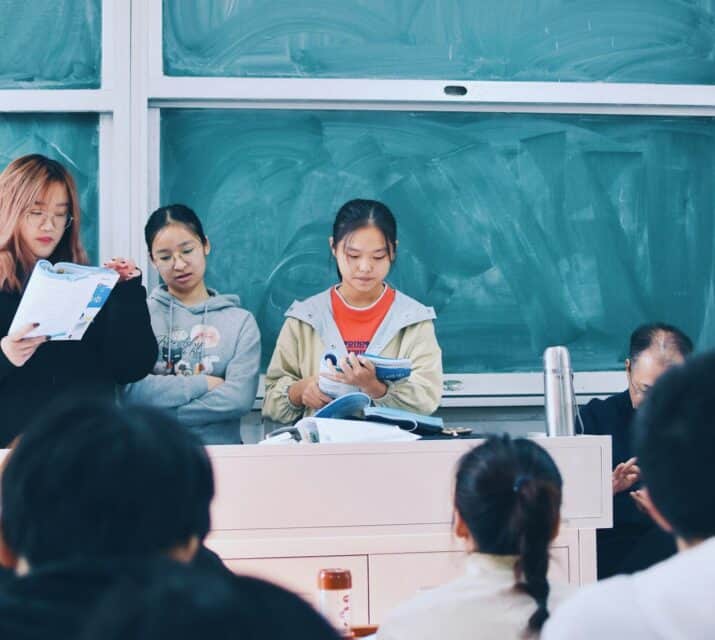As geopolitical tensions flare up, international eduction is weighing up how to operate in the world’s second most populous country.
Leaders are urging the education sector to engage with China, and last week, a group of 20 UK university representatives joined the UK-China Higher Education mission.
Speaking with The PIE, director of UUKi Jamie Arrowsmith, emphasised that China “matters for the UK higher education, it matters for the UK”.
“It’s important in terms of recruitment, transnational education and research. Our ambition to go was really trying to reconnect and make those connections that we may be used to have and see where the land lies,” he said.
The delegation was the largest of its kind to travel to China since 2019, meeting representatives from 44 Chinese universities.
“Now is not the time to turn away from China engagement, despite the geopolitical challenges and volatile rhetoric,” Leina Shi, British Council China director for education noted.
Earlier this year, UK foreign secretary, James Cleverly, travelled to China, which indicated that the UK government is open to collaboration with the country, stakeholders say.
“Senior level face-to-face engagement is very helpful in building trust and understanding bilateral opportunities across teaching and research,” Shi said.
Governmental committees in the US and the UK have however delved into the risks of higher education engaging with China.
In July the House Select Committee on the Chinese Communist Party targeted a joint research institute between UC Berkeley and Tsinghua University – which was set up in 2014 – for giving China “easy access” to research it can use to “its economic, technological, and military advantage”.
Similarly in the UK, the Intelligence and Security Committee published a report in July accusing China of acting “in plain sight – directing, funding and collaborating on academic research for its own ends”.
Responding to the report in September, the UK government said it recognises the committee’s concerns regarding interference, the potential to stifle debate, IP theft and the risk of sensitive technology transfer.
Downing Street had already outlined that the UK government would engage with China to cooperate on shared priorities when they match the national interest in its Integrated Review Refresh, released in March.
“There’s been a huge amount of work done in the sector to raise awareness of all of the risks and challenges”
Since the committee collected most of its evidence in 2020, the government noted that it has made a “great deal of progress”. It has expanded the Academic Technology Approval Scheme and adopted the National Security Act and Higher Education (Freedom of Speech Act), it said.
Since 2020, UUK has also published guidelines to help universities tackle security risks related to international collaboration.
For Arrowsmith, the ISC report is not a “fair reflection of the situation now”.
“There’s been a huge amount of work done in the sector to raise awareness of all of the risks and challenges around international collaboration,” he told The PIE. “There’s been a real step change in the kind of recognition of the issues.”
Much has been sector-led, he continued, such as the complex collaborations report from the Association of Research Management Administrators and a training package developed by the Higher Education Export Controls Association.
UUK has also partnered with rector conferences internationally on joint statements on safe, secure and sustainable internationalisation. “But it isn’t a simple landscape,” he acknowledged.
“We think constructive engagement and a continued collaboration [with China] is in our interests. It is very obvious that there is an extremely challenging political relationship between the UK and China…
“There are restrictions on the things that we can work together on, [but] that is actually no different from the rules and regulations in place on the Chinese side as well… It really is about finding those areas that are of mutual and shared interest.
“Between the foreign secretary’s mansion house speech, the integrated review and the visit, I think there is quite a helpful and pragmatic message about UK-China collaboration that it’s in all our interest to have a constructive relationship, absolutely recognising there are challenges and difficulties,” Arrowsmith told The PIE.
The difficult political relationship is something the mission confronted head on in a number of set piece speeches, he added.
Institutions are also trying to understand the recruitment landscape in China.
Speaking with The PIE recently, Navitas CEO Europe & global chief operating officer, Paul Lovegrove, noted that while China is the one market that hasn’t settled down since Covid, it was a market that was already shifting.
During the pandemic, Curtin’s campus in Singapore was the “biggest growth campus”, thanks largely to Chinese students being happy to travel to the island state.
“That’s quite stuck… Covid has sort of accelerated this slightly different approach to new markets, and therefore the supply side has had to respond to that,” he told The PIE.
The “long-term fundamentals are still there”, he added, pointing to the wealthy, aspiring middle class and the huge population seeking a supply of high-quality education in a country that cannot meet demand.
Higher education analyst, Higher Insights, has highlighted China as an outlier in recent UK Q2 study visa statistics. While the rest of the world saw an increase of 396% in Q2 2022 on the same quarter in 2019, China had dropped by 59%.
It stated that the difference between China and the rest of the world was due to China being a mature market, Chinese student preference for Russell Group institutions and most Chinese students arriving in Q2 to take Pre-sessional English courses.
“Universities in the QS top 100 best protected”
Higher Insights founder, Dave Amor, noted that it is hard to be precise for Q3 arrivals from China, but “looking at China performance for competing countries, we see numbers rising steadily but not to pre-pandemic levels”.
A drop in inclination to travel long distances among Chinese students suggests a slight decline for the autumnal intake is “likely” – predominantly due to increased competition from traditional and newer competitors, he added.
“Universities in the QS top 100 best protected” from competition, Amos continued.
Arrowsmith noted that the UK’s pandemic response where it kept borders open, has given it an edge in regards to recruitment in recent years, but that is now looking to change.
“The UK was different from many of the other major recruitment markets [during the pandemic],” he said.
“We do know that Australia has a very, very clear priority to regrow and regain its position [in China]. So I think it is definitely becoming a challenging market for institutions but I think overall we’re probably going to see a kind of stability.”












